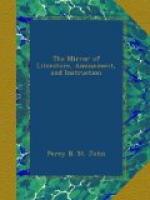The passion of the Scots, from whatever race derived, for poetry and music, developed itself in the earliest stages of their history. They possessed a wild imagination, a dark and gloomy mythology; they peopled the caves, the woods, the rivers, and the mountains, with spirits, elves, giants, and dragons; and are we to wonder that the Scots, a nation in whose veins the blood of all those remote races is unquestionably mingled, should, at a very remote period, have evinced an enthusiastic admiration for song and poetry; that the harper was to be found amongst the officers who composed the personal state of the sovereign, and that the country maintained a privileged race of wandering minstrels, who eagerly seized on the prevailing superstitions and romantic legends, and wove them in rude, but sometimes very expressive versification, into their stories and ballads; who were welcome guests at the gate of every feudal castle, and fondly beloved by the great body of the people.—Tytler’s History of Scotland.
* * * * *
TO CONSTANTINOPLE,
On approaching the city about sun-rise, from the Sea of Marmora.
A glorious form thy shining city wore,
’Mid cypress thickets of perennial
green,
With minaret and golden dome between,
While thy sea softly kiss’d its
grassy shore.
Darting across whose blue expanse was
seen
Of sculptured barques and galleys many
a score;
Whence noise was none save that of plashing
oar;
Nor word was spoke, to break the calm
serene.
Unhear’d is whisker’d boatman’s
hail or joke;
Who, mute as Sinbad’s man of copper,
rows,
And only intermits the sturdy stroke
When fearless gull too nigh his pinnace
goes.
I, hardly conscious if I dream’d
or woke,
Mark’d that strange piece of action
and repose.
* * * * *
BERWICK.
In the thirteenth century Berwick enjoyed a prosperity, such as threw every other Scottish port into the shade; the customs of this town, at the above date, amounted to about one-fourth of all the customs of England.
* * * * *
SPIRIT OF THE PUBLIC JOURNALS.
* * * * *
THE LORD MAYORS DAY.
“Spirit of Momus! thou’rt
wandering wide.
When I would thou wert merrily perch’d
by my side,
For I am sorely beset by the
blues;
Thou fugitive elf! I adjure thee
return,
By Fielding’s best wig, and the
ashes of Sterne,
Appear at the call of my muse.”
It comes, with a laugh on its rubicund
face;
Methinks, by the way, it’s in pretty
good case,
For a spirit unblest with
a body;
“On the claret bee’s-wing,”
says the sprite, “I regale;
But I’m ready for all—from
Lafitte down to ale,
From Champagne to a tumbler
of toddy.




